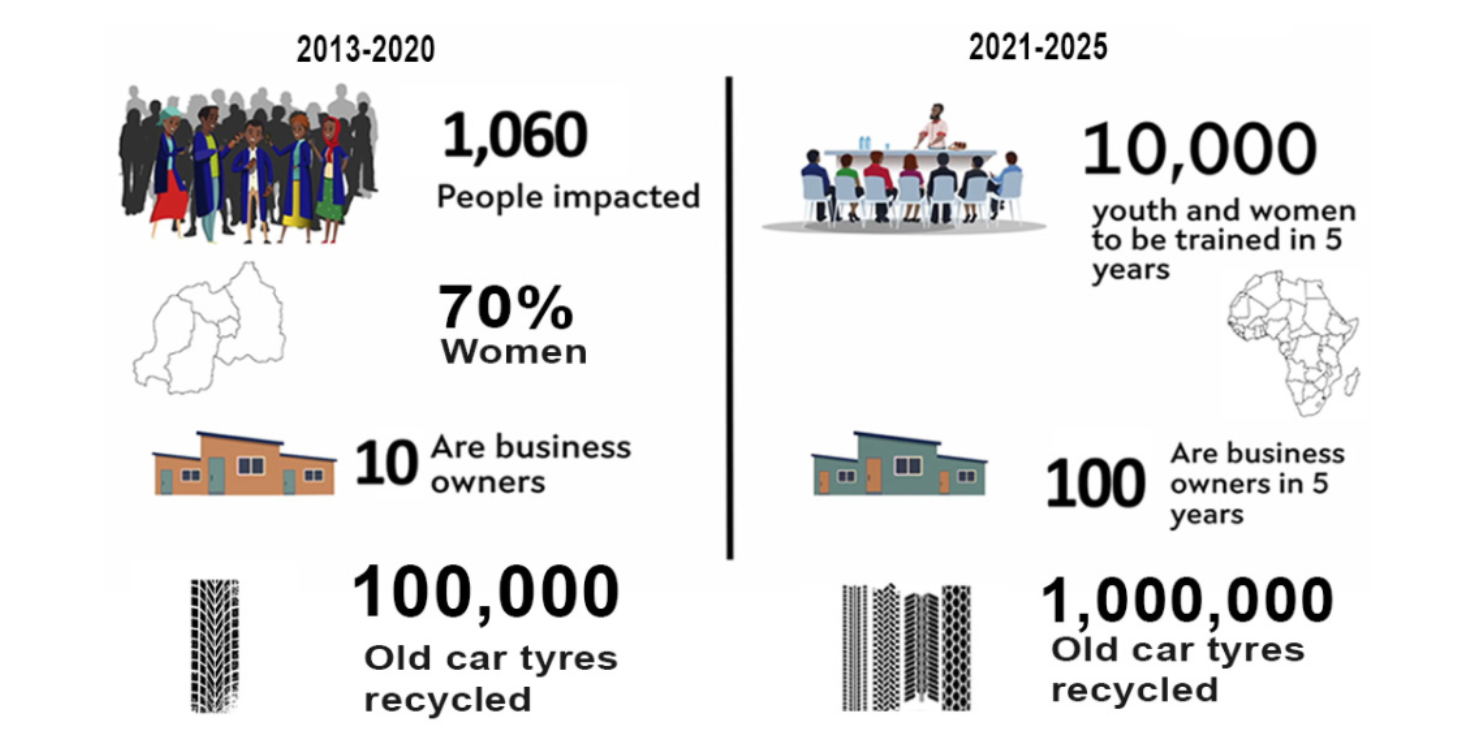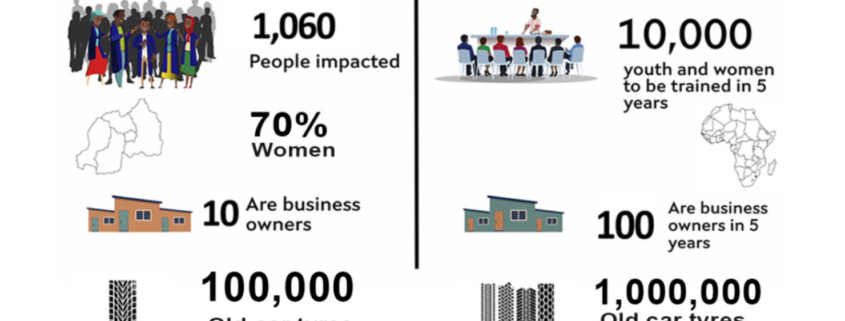You’ll never do wrong by doing right — Lionesses of Africa

By the Lionesses of Africa Operations Department
‘Doing right’ means different things to different people, but in business it is absolutely essential and represents your core values. The above photo showing the impact that UZURI K&Y, the Rwandan business founded by entrepreneurs Kevine Kagirimpundu and Ysolde Shimwe, has had on so many lives as a perfect example of this. So, “What are the core values of your business?” could have been the title this week…
Why does it matter?
Core values are absolutely central to your life as a business woman – without core values you could quickly find yourself in a position where you flip-flop between many different directions, many different employees, customers and suppliers – as if you don’t have enough to worry about! Sooner or later the word will get out and you will find it has become very lonely.
“There are plenty more employees/customers/suppliers out there” is the usual battle cry you hear from such companies.…and this is how it plays out:
New customers won’t take your calls once they hear how previous ones were treated. Your ex-customers are now just happy that they have suppliers they can rely on, who follow through with their promises and simply deliver, and on the occasions that there are issues (as there often are), not hide but simply pick up the phone and talk through a solution. Suppliers will give up working with you, exhausted at the incessant re-negotiations, broken promises and trials and tribulations of having to jump through yet another hoop to please the ever changing views of their flip-flopping client. Employees? Well, good luck with that! If you have any left you’ll realize (too late) that it’s only the dead wood – all the best having given up and left. Then there’s the legal cases that mount up from disgruntled employees, suppliers with broken contracts and clients with no deliveries. Sounds like fun doesn’t it!
Please don’t think that it is just a male run company issue, this can come from anyone and anywhere. Harvard Business Review (here) says that “Culture has become a strategic priority with impact on the bottom line” in recent years given a few high profile cases, but we argue that it has always had an impact on the bottom line, it’s just being reported more now.
Harvard Business Review goes on to say that: “…culture can be defined as the ways people in the organisation behave and the attitudes and beliefs that inform those behaviours (i.e., “the way we do things around here”) — including formal, stated norms as well as implicit ways people work and interact.”
As a Leader you have a huge responsibility to not only communicate the core values of the company, but to also ensure they are supported and driven by everyone in the company. You cannot be in all places at the same time, so you have to trust your employees and management to do the right thing – this is essential, as without it the vision of the company is worthless.
This is also an important point. Your vision as a leader for your company cannot be successful unless your culture and core values align, allowing for the vision to be seen, heard, understood, supported and then implemented throughout your company. If they understand the core values they will follow, if ordered to get in line, they will not.
Colin Powell says that, ‘leadership is the ability to get someone to follow you even if only out of curiosity’, but to get to that stage there has to be trust. Trust that you as a leader have their best interests at heart.
As Ben Horowitz, cofounder of a16z and one of Silicon Valley’s most respected and experienced entrepreneurs says in his book, “The Hard Thing About Hard Things: Building a Business When There Are No Easy Answers” (here):
“Consider the following: If I trust you completely, then I require no explanation or communication of your actions whatsoever, because I know that whatever you are doing is in my best interests. On the other hand, if I don’t trust you at all, then no amount of talking, explaining, or reasoning will have any effect on me, because I do not trust that you are telling me the truth.” How true is that!
We heard this brilliantly explained in a podcast by Heidrick and Struggles the other day (here) in an interview by their Ed Manfre with Mark A. Gabriel, the CEO of WAPA (the Western Area Power Administration in the USA), about ‘The importance of leadership and culture as critical levers of business performance’. Indeed this week’s title is from this podcast and is something that Mark strongly believes and has shown over years through his actions.
“You’ll never do wrong by doing right.”
He believes that a strong culture allows a business to survive and even thrive during times of great stress, but none of this can happen without strong leadership. Please be very aware, ‘strong leadership’ does not come from marching around the office and yelling orders. In fact ‘strong leadership’ is all about ‘leading by example’, being ‘fair but firm’, creating a strong management team and middle management who will follow through with decisions made, on occasions having to face-up to making the tough decisions (these cannot be avoided), communicating (so important), doing what you say (ditto!) and finally as Mark says: “…giving people the freedom to do the right thing.”
How do you drive that? One of the issues he found was that employees who were great at their jobs were promoted into leadership roles, but just because they were a great engineer (for example) this did not mean that leadership came automatically. This is often forgotten in organisations and so far more effort has to be given into training for leadership.
In fact he took it one step further in turning around this huge company, he doesn’t just train the vertical (as in the leadership as one goes up in a company), but the horizontal (to train across areas of the business). He calls this becoming a ‘student of the business’, so that across areas and divisions employees started to realize ‘why we do what we do’. Why finance has blocked a purchase order, why the engineers desperately need a particular coolant from one particular factory, why HR insists on stringent Health and Safety – even why the MD insists that all cars must be reversed into parking bays at the factory (small hint – allows for quick exit in case of fire or explosion).
This has been taken one step further by our truly inspirational Lionesses, Kevine & Ysolde of UZURI K&Y who not only train all their employees in the making of their fabulous sandals, but recognizing they couldn’t employ everyone who applied for jobs with them, set up a training program to teach the soft skills needed to help them navigate the job market and also (a brilliant addition) business skills to guide any who wanted to set up a business. Through this vision, since 2013, Kevine & Ysolde have impacted the careers of over 1,060 people — 70% of which are women — and have even helped 10 former employees launch their own businesses. Their incredible statistics and vision as shown by this week’s headline photo above, from the beautiful UZURI K&Y website, here.
The other issue for Mark that was important was inclusion and diversity. This does not mean simply bringing people in from all backgrounds and ethnicities, however essential that is, but to include all by listening to all. Not just those who make the noise or raise their hands, but seriously all, especially the quiet thoughtful ones. This is very important as they have just as much invested in the vision and future of the company, and by being quiet and observing, they may well have seen serious issues, or have brilliant solutions to known problems. Even if they don’t, bringing them in to discussions just increases the Trust.
The problem with running a business is, of course, the responsibility – a responsibility that is certainly not easily shared. As Ben writes:
“Every time I read a management or self-help book, I find myself saying, “That’s fine, but that wasn’t really the hard thing about the situation.”
The hard thing isn’t setting a big, hairy, audacious goal.
The hard thing is laying people off when you miss the big goal.
The hard thing isn’t hiring great people.
The hard thing is when those “great people” develop a sense of entitlement and start demanding unreasonable things.
The hard thing isn’t setting up an organizational chart.
The hard thing is getting people to communicate within the organization that you just designed.
The hard thing isn’t dreaming big.
The hard thing is waking up in the middle of the night in a cold sweat when the dream turns into a nightmare.”
As he says: “The problem with these books is that they attempt to provide a recipe for challenges that have no recipes…” Yet with a culture of Trust that spreads through to customers and suppliers, not just employees and management, and a knowledge that whatever your decisions they were made with their best interests at heart, that cold sweat can be lessened, and support even for the tough decisions that you have to make, will be there.
Whatever your vision, whatever your core values, whatever your culture, Trust must be at the centre. Everyone from customers, to suppliers, to employees, even ex-employees who have gone on to other companies or started their own businesses, this Trust, this belief that you have their best interests at heart is central.
This starts by realizing that as Mark said:
“You’ll never do wrong by doing right.”
Stay safe.




Leave a Reply
Want to join the discussion?Feel free to contribute!